All of us have unique minds and different thinking patterns. Some of us tend to be analytical while some others tend to be creative. Some tend to focus on problems, while some focus on solutions. Our flawed thinking patterns are known as cognitive distortions which define our perception of reality. So what is your thinking style and how do you see your reality?
What are cognitive distortions?
These are inflated and illogical thought patterns and belief systems that often negatively twist how we perceive the world. Cognitive distortions refer to errors in our thought patterns that make us understand reality in an inaccurate way.
These can either be habitual or instinctual thoughts and are typically negatively biased. As such distortions in thinking tend to be common, these can be really difficult to identify, especially when we are unaware that we can change them.
Unfortunately, most people spend their entire lives accepting these distortions and believing their warped perceptions. Psychologists believe that having these thinking errors can cause or worsen various mental health issues like stress, anxiety, paranoia, obsessive-compulsive disorder (OCD), and depression.
These can even lead to relationship problems and cause unnecessary complications in our personal lives.
“Cognitive distortions are negatively biased errors in thinking that are purported to increase vulnerability to depression,” explains researchers from a 2016 study. When encountering certain situations, most of us have some automatic thoughts as an emotional or behavioral response.
These automatic thoughts are usually based on our core beliefs about ourselves and the world. Negative automatic thoughts arise from negative core beliefs which may be triggered by negative, neutral, or positive situations or events.
The phenomenon was initially observed by psychiatrist Aaron T. Beck and was later studied by psychiatrist David D. Burns. It is found that negative thinking causes negative perceptions or schemas which reinforce negative thoughts & emotions.
Read also: How Cognitive Distortions Harm Us

Research shows we can develop negative automatic thought patterns when we have been exposed to adverse life events frequently, especially in childhood. The duration and intensity of these adverse experiences influence the volume of thinking errors we develop.
However, another study has found that cognitive distortions may be a form of evolutionary defensive & survival mechanisms that are sensitive to threats.
The study explains “humans evolved to think adaptively rather than logically. Hence cognitive distortions are not strictly errors in brain functioning and it can be useful to inform patients that ‘negative thinking’ may be dysfunctional but is a reflection of basic brain design and not personal irrationality.”
Types of cognitive distortions
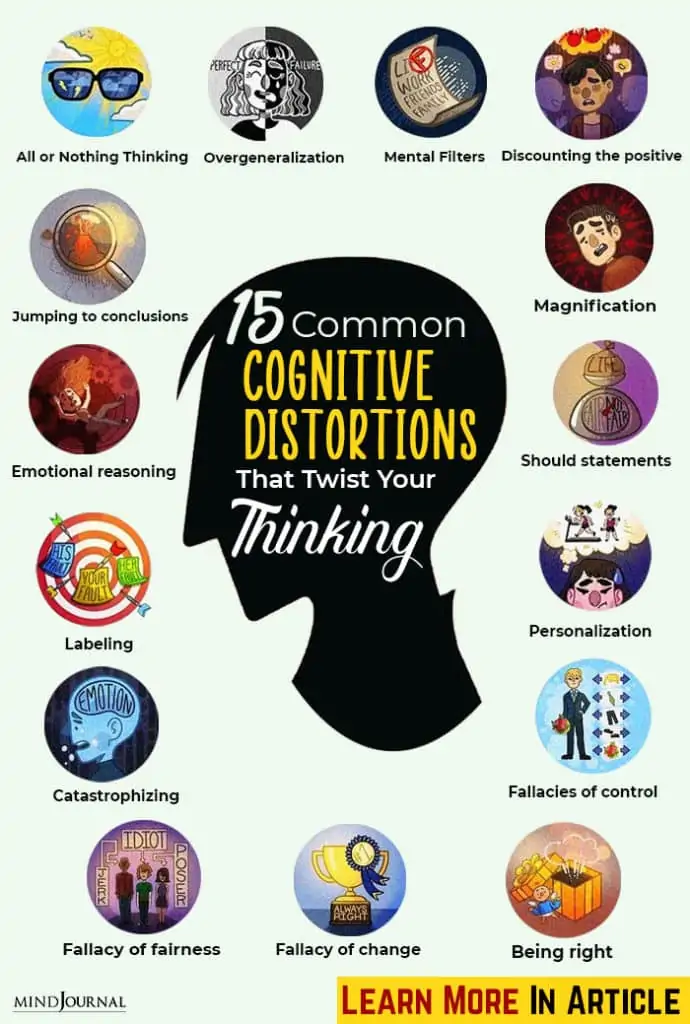
According to psychiatrist Aaron Beck’s research on cognitive distortions, 15 common types of thinking errors have been identified. Check these out below to see if you can relate with any of these:
1. All-or-Nothing Thinking
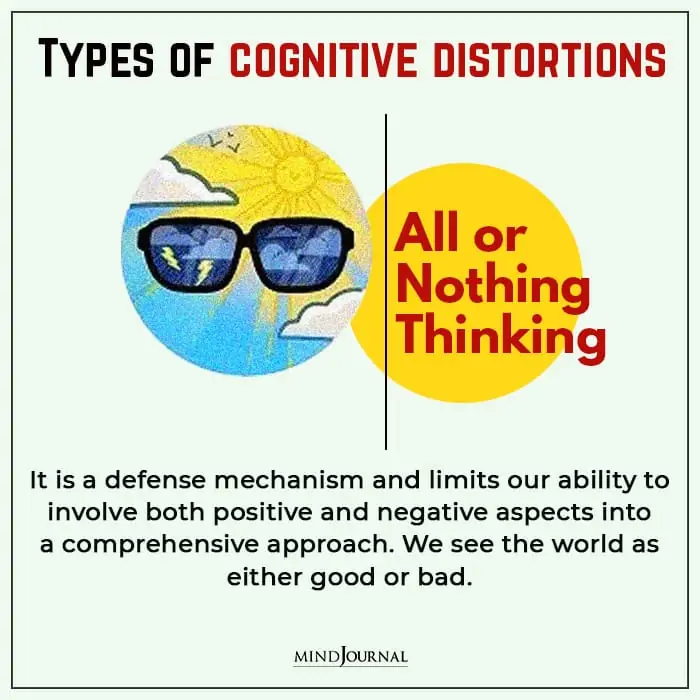
Also known as splitting or black and white thinking, it refers to a thought pattern that focuses on observing things in extremes or absolutes. It is either everything or nothing at all. This type of distortion can cause relapse.
Described by psychoanalyst Ronald Fairbairn, it is our inability to involve both positive and negative aspects of ourselves, others, or the world into a comprehensive and realistic approach. It is a defense mechanism that considers someone’s intentions and actions as either good or bad, white or black without any shades of gray.
If a person is on a diet and they had a cheat meal during a social gathering, then they may believe that their diet routine has completely failed. This can lead to further destructive or malfunctional behavior. It is commonly observed in perfectionists.
Read also: 3 Cognitive Strategies To Deal with Bad News
2. Overgeneralization
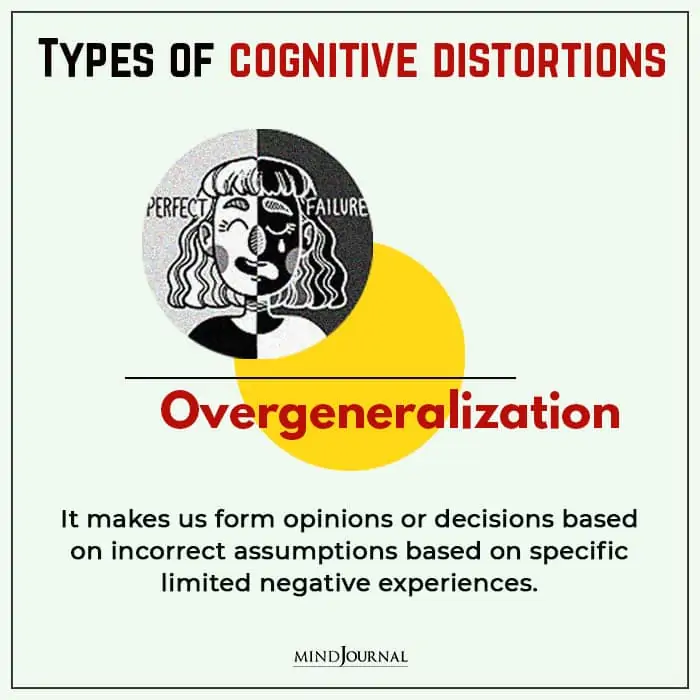
Some people tend to make faulty generalizations based on inadequate proof or evidence. These individuals form an opinion or make a decision based on a particular experience or event or even a handful of coincidences, which are mostly negative.
Hence, they tend to jump to conclusions with limited information, evidence, or a single event or experience. If they have had a bad experience just once, they will believe it will occur repeatedly. People with such cognitive distortions tend to say phrases like “never” or “always” constantly.
If a person has been rejected romantically once, they may develop a false belief that others potential romantic partners will reject them as well. Hence, they may refrain from dating or even approaching others. Research shows that overgeneralization is related to anxiety disorders and PTSD (post-traumatic stress disorder).
3. Mental Filters
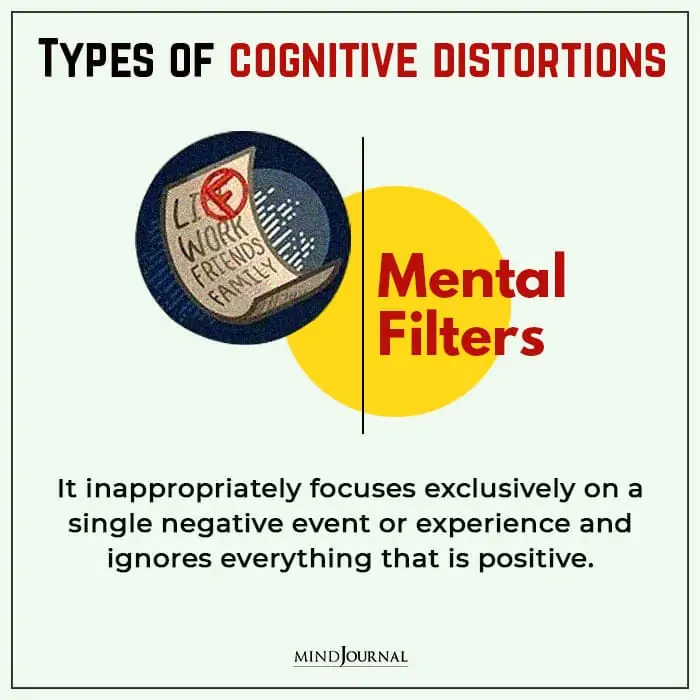
This is regarded as the complete opposite of overgeneralization, however, with similar adverse effects. It is a distorted thought pattern that inappropriately focuses only on a single negative event or experience and ignores everything that is positive.
Considering negative experiences or events exclusively is not only an ineffective process but can be damaging as well as it can worsen symptoms of anxiety & depression. Dwelling on a particular negative detail darkens the perspective of the thinker magnifying the negative aspects while filtering out the positive aspects.
For instance, almost all of your friends “like” and comment on your new post on a social media platform, except one particular person. Filtering will make you obsess about why that specific person has not reacted to your post and ignore all the positive reactions you got from the others.
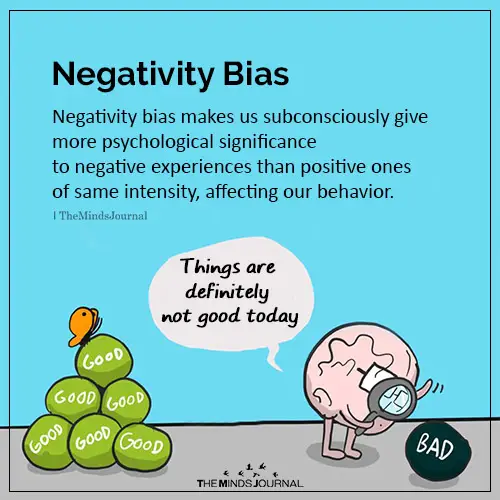
It has been observed that when we have negative perspectives about ourselves, our reality, and our future, then it can lead to hopelessness and depression. When not addressed, such thinking errors can even lead to suicidal thoughts and ideations.
Read also: Understanding Depression With Beck’s Cognitive Triad
4. Discounting the positive
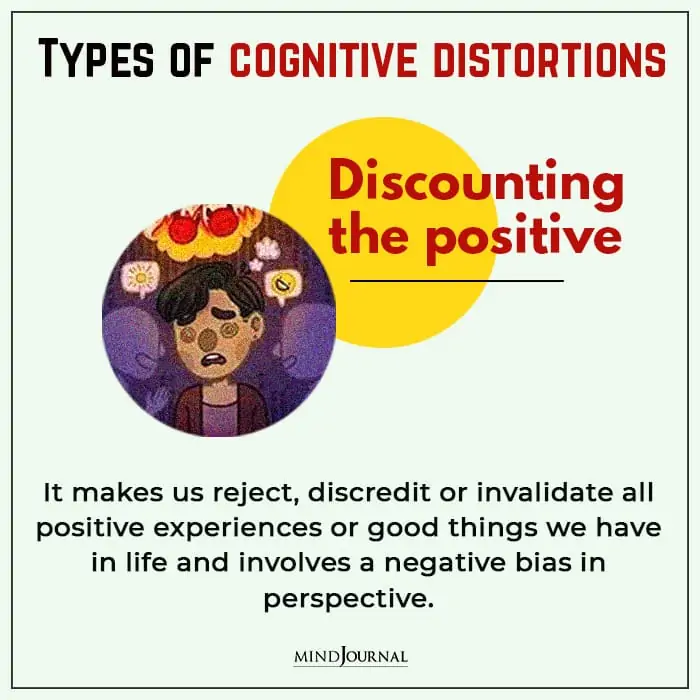
This is another type of cognitive distortions that makes someone reject, discredit or invalidate all positive experiences or good things they have in life. Similar to mental filters, this pattern of thought includes a negative bias in perspective and thoughts.
If you have this distortion, then you will not only ignore the positive, you will completely overlook and justify it as luck, accident, or a coincidence. It can make you feel miserable & unrewarded in life and adversely affect your sense of self-worth and self-esteem as you will think you are inadequate.
People who discount the positive acknowledge external factors more than their own hard work, skill and determination. This can cause learned helplessness and decrease motivation as they believe they can’t control external factors like luck. For instance, if you get a promotion at work for your effort and performance, you may believe it happened due to luck or was probably a mistake.
5. Jumping to conclusions
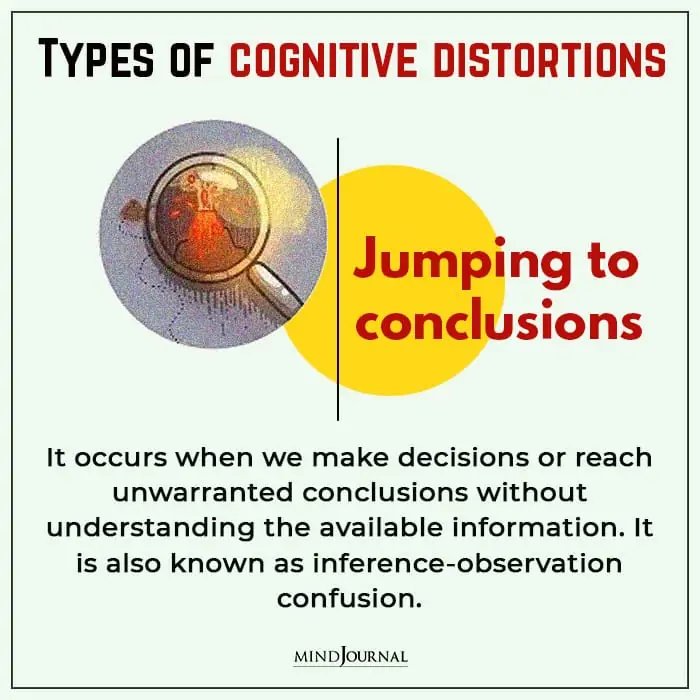
Also known as the inference-observation confusion and the jumping conclusion bias, it is a thinking error where a person makes decisions or reaches unwarranted conclusions without understanding or analyzing all the available information. This can often lead to rash, uninformed decisions that can be harmful to the thinker or others.
Jumping to conclusions may make you mistakenly believe that you know how another person is thinking or feeling, even though you may be completely wrong. According to experts, jumping to conclusions is primarily of two main types:
A. Mind reading
When you randomly believe that someone is having negative thoughts or emotions about you without accessing all the facts. For instance, you may believe a coworker is trying to sabotage your work or has a grudge against you, but this belief is not based on any facts or information. Studies show that this thought distortion is commonly observed in kids and is linked to anxiety.
B. Fortune telling
When you tend to anticipate or even predict that something will occur negatively or lead to a bad outcome so that you can avoid putting effort into accomplishing it. For example, a student may believe that they will fail in math and may not put in the necessary effort to pass the semester as they falsely believe they will flunk.
Read also: Top 10 Foods To Boost Your Brain Power & Health
6. Magnification
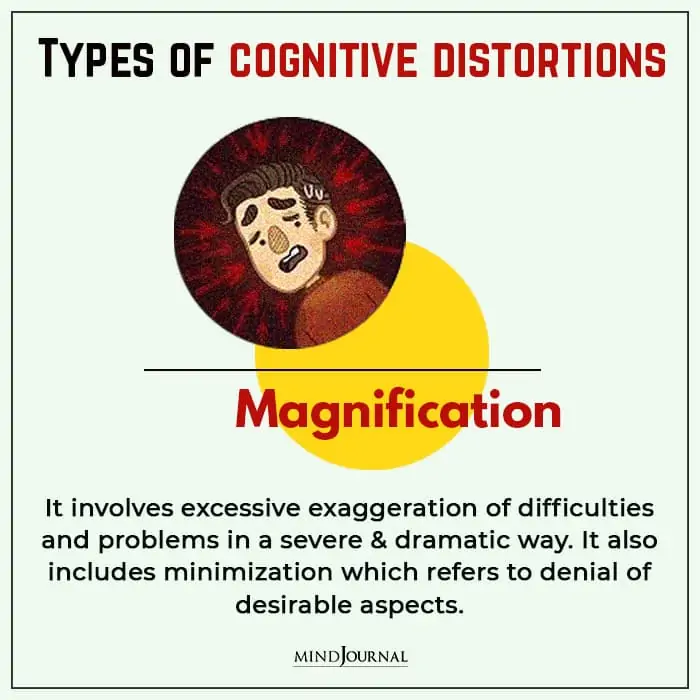
Magnification refers to the exaggeration of difficulties, challenges, problems, and drawbacks in a severe or dramatic way. This form of cognitive distortions also involves minimization which refers to denial or rationalization of desirable aspects. People who exaggerate are often identified as a ‘boaster’.
They assign illogical amounts of importance to threats, shortcomings, weaknesses, and perceived failures. Minimization typically downplays the value of an experience, emotion, or event and assigns proportionally lesser significance to opportunities, strengths, and accomplishments.
These can be considered as a form of deception and are also known as the binocular trick. For instance, a person addicted to antidepressants may exaggerate how depressed, anxious, and stressed they feel without the medication while minimizing the side effects of overuse or addiction.
7. Emotional reasoning
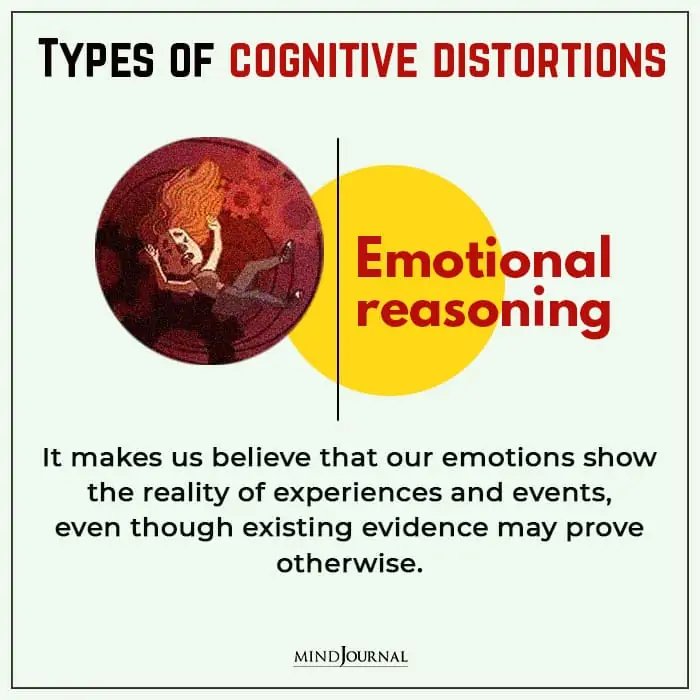
It is a type of thinking distortion where you assume that your emotional response or reaction to something establishes reality or proves as the truth, even though existing evidence may prove otherwise. It only results in an emotional truth that may contradict your perceptional truth.
Emotional reasoning makes us believe that our emotions show the reality of experiences and events. This thinking error makes us form our own truth based on our feelings and emotions.
For instance, you may feel guilty for expressing your anger and hence believe that you are a terrible person. However, in most cases, our emotions are not reliable judge of the truth. According to research, like some other cognitive distortions, emotional reasoning is also linked with anxiety or depression.
8. Should statements
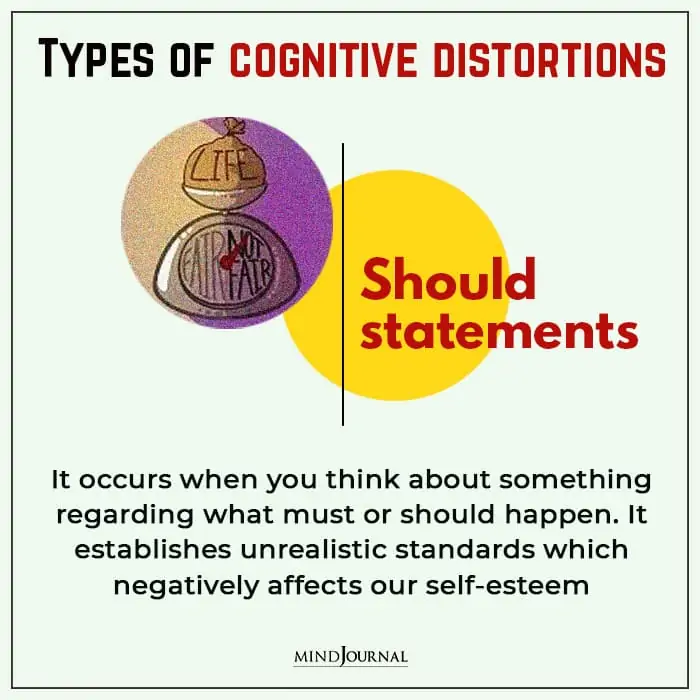
Making should or must statements is also considered as a type of thinking error. Cognitive distortions occur when you think about something regarding what must or should happen. These are typically self-defeating statements and are negative ways to talk to yourself.
Should statements establish unrealistic standards which can negatively affect our sense of self and self-esteem, especially when we are unable to attain such standards. It can also lead to severe anxiety and panic attacks.
Statements like “I should get the promotion,” or “I must have a healthy lifestyle,” set unnecessary rules and limit your behaviors. When you or someone else breaks these rules, it can make you feel stressed, frustrated, angry, or guilty.
Although some people believe that should statement help them to stay focused and motivated, punishing yourself is not necessarily the best technique to achieve success. For instance, a person who believes that they “must” exercise regularly can feel guilt, shame, and upset when they miss out on a workout.
Read also: 13 Unhealthy Habits That Reveal A Workaholic
9. Labeling
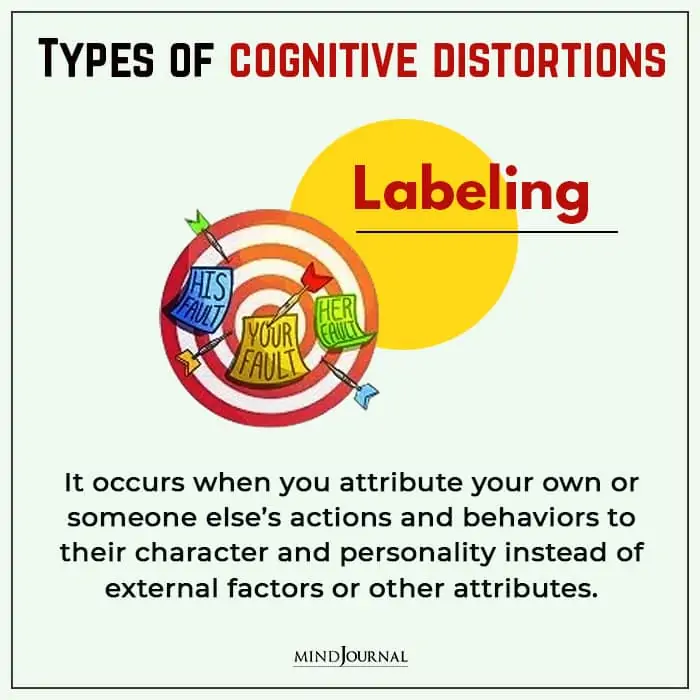
This is a type of overgeneralization where you attribute your own or someone else’s actions and behaviors to their character and personality instead of external factors or other attributes.
You tend to label another person based on what they have done or their perceived character, even though their behavior may be determined by other factors.
Labeling is one of the most common cognitive distortions that is based on making judgments about self or others and berates someone’s personality based on one single trait, behavior or event, which is mostly negative. If you believe someone is an alcoholic simply because they enjoy their drink, then you are labeling them as a drunkard.

This pattern of thinking makes you underestimate or misunderstand another person, which can affect relationships as this can be embarrassing and insulting for the person being labeled. Labeling is often biased and emotionally influenced. Labels often cause stress, hopelessness, hostility, frustration, anxiety, anger and poor self-esteem.
Read also: 3 Ways to Stop Judging Others By Their Body Image
10. Personalization
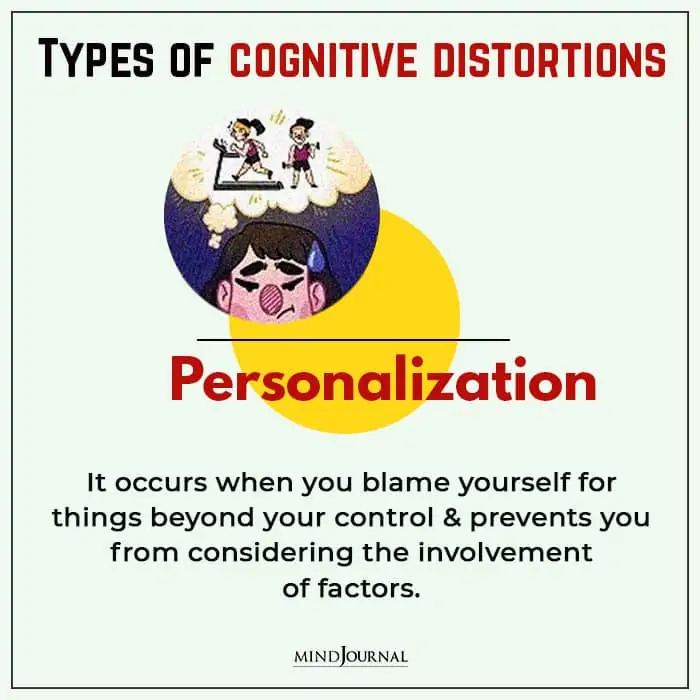
Personalization & blame are some of the most common cognitive distortions. By taking things personally and blaming ourselves for the negative outcome even when it is not our fault, we increase or worsen our anxiety and depression.
Personalization occurs when you blame yourself for things beyond your control. It prevents you from considering the fact that a number of different factors may be involved in the occurrence of a negative event or situation. Personalization also makes you falsely believe that reactions and responses from others are direct, personal attacks on you.
You may also end up comparing yourself with others and take almost everything on a personal level. For instance, if your child fails an exam at school, you may blame yourself for not being a good parent by taking the outcome personally. Personalization & blame causes feelings of guilt, embarrassment, inadequacy and shame.
However, in certain cases the opposite thinking error can also occur where someone may blame only others for an undesirable outcome and fail to realize how they may have contributed to it. For example, if you have an unhealthy relationship, you may blame your partner for it without realizing how your toxic behavior is also at fault.
11. Catastrophizing
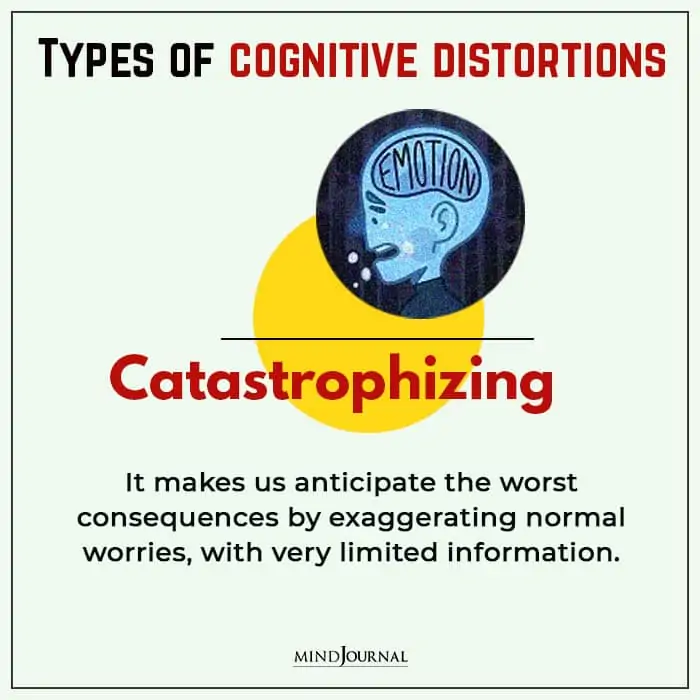
Catastrophizing is a distorted form of thinking which occurs when people anticipate the worst consequences by exaggerating normal worries when experiencing uncertainty.
This type of distortion in thought makes you falsely believe that you are experiencing worse outcomes than you actually are. “Catastrophizing is a cognitive distortion that prompts people to jump to the worst possible conclusion, usually with very limited information or objective reason to despair,” explains Psychology Today.
Considered as a type of magnification, it makes someone exaggerate the problems and challenges they face in life. Although some may believe that it is simply an over-exaggerated reaction to stressful situations, it is a complicated and unintentional tendency.
The thinker may predict unfavorable outcomes and then may believe that it will be disastrous if the predicted outcome actually occurs. It can make them believe they are experiencing a crisis even faced with a mildly upsetting situation. Unfortunately, this is one of the types of cognitive distortions that can cause severe health issues, like panic attacks, anxiety depression etc.
For instance, a student may think that if they fail a semester, they will never be able to graduate and build a successful career. Someone who is catastrophizing may not be aware that they are engaging in it.
Read also: How To Improve Fluid Intelligence: 5 Science-Backed Ways To Boost Your Cognitive Skills
12. Fallacies of control
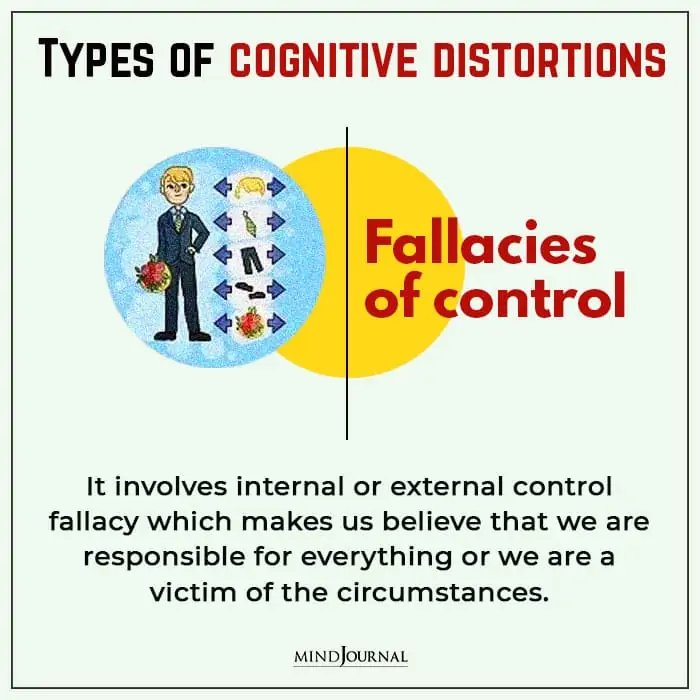
It is a flawed pattern of thinking involving having internal control or being controlled externally. The thinker has two extreme beliefs regarding control of circumstances in life. In the case of the external control fallacy, they may believe that they have no control over any aspect of their life and feel helpless.
For instance, if you find yourself working overtime regularly, you may blame your boss for giving you too much work instead of identifying any time management issues that you may have. Internal control fallacy makes the thinker believe that they are responsible for everything.
They may feel personally responsible if someone is upset or facing a difficult time and tend to take the blame for unfavorable outcomes. For example, if your partner is trying to cope with excessive work pressure, you may try to feel responsible for making them happy when they come home.
External control fallacy leads to the development of a victim mentality, while internal control fallacy makes you feel more accountable even when it’s not your responsibility, making you feel exhausted.
13. Fallacy of fairness
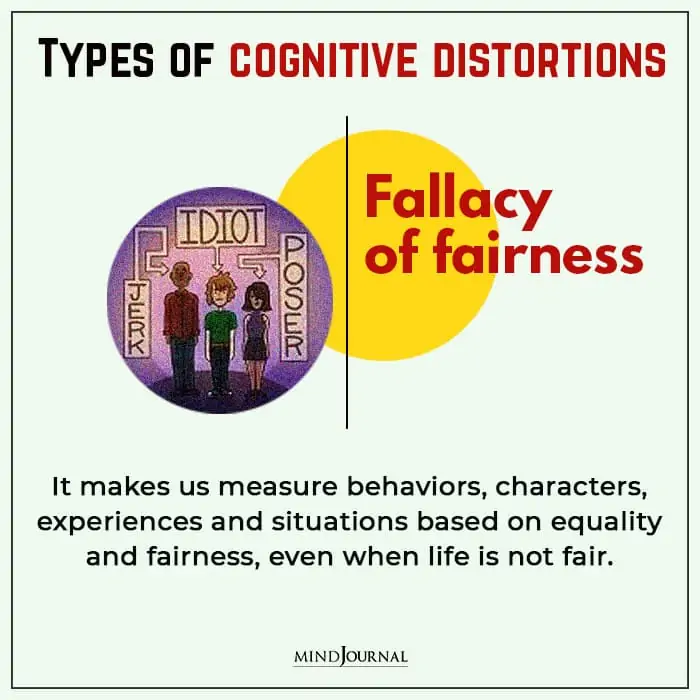
This fallacy is also considered as one of the main cognitive distortions. It makes you analyze and measure behaviors, characters, personalities, experiences, events and situations based on equality and fairness. However, life is usually not fair and this can make you bitter and resentful.
If you keep judging every aspect of your life based on how fair it is, you will be left disappointed and hopeless when facing reality. Things don’t typically play out in a fair manner, although they should. For instance, infidelity in a relationship can be seen as wrong but cheating is common in relationships and is often driven by the behavior of both partners.
Fairness is a subjective topic and is often hard to define without falling into the trap of self-serving intentions. Most of us tend to assume how certain things should be if the world was fair. However, others may not agree with your own personal opinion of fairness. This can cause you a lot of pain, anger, frustration, and sadness.
Read also: 35+ Mind Bending Psychology Facts About Human Behavior
14. Fallacy of change
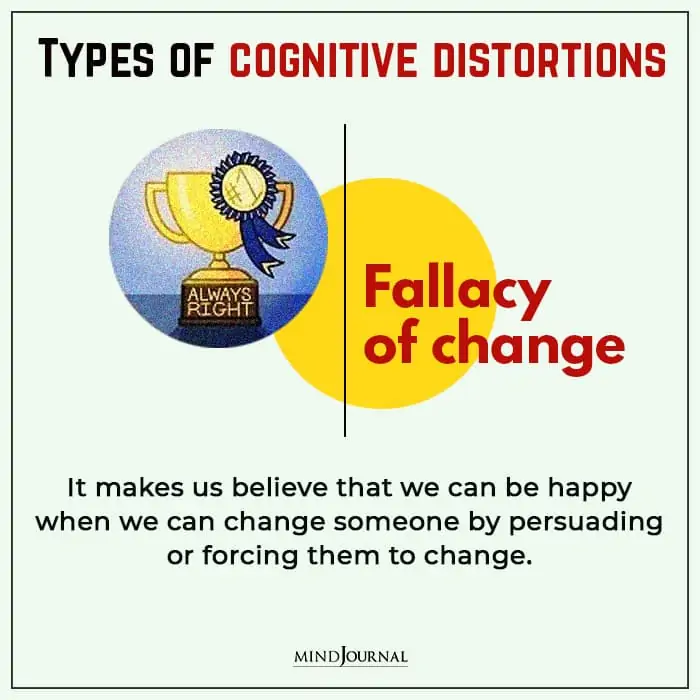
Another type of fallacy considered as one of the common cognitive distortions is the fallacy of change. In this form of distorted thinking, you may tend to believe that you can change someone by persuading or forcing them to change.
People with this fallacy believe that they can only be happy when someone changes their mentality, attitude and behavior. It is mostly observed in intimate relationships and is regarded as a selfish and manipulative behavior. For instance, you may attempt to change your partner’s wardrobe believing they will look more presentable. However, this only shows that you are unable to accept them for who they are.
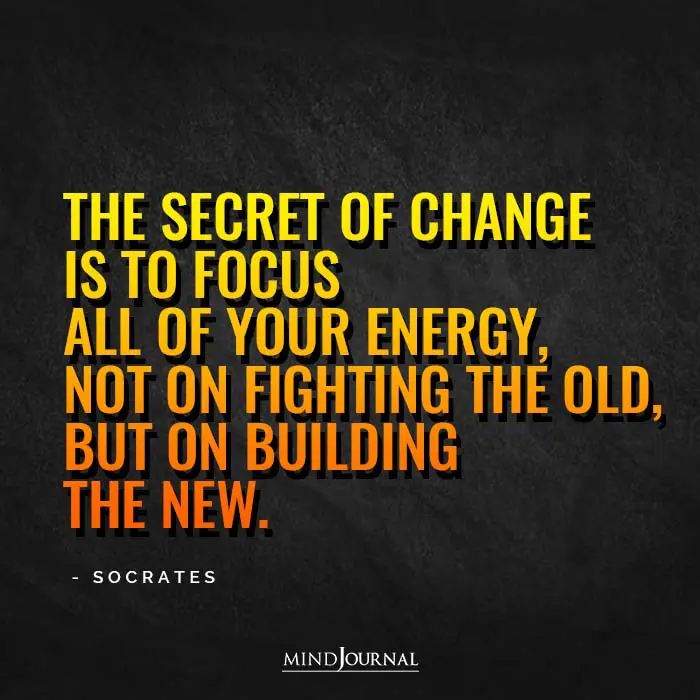
15. Being right
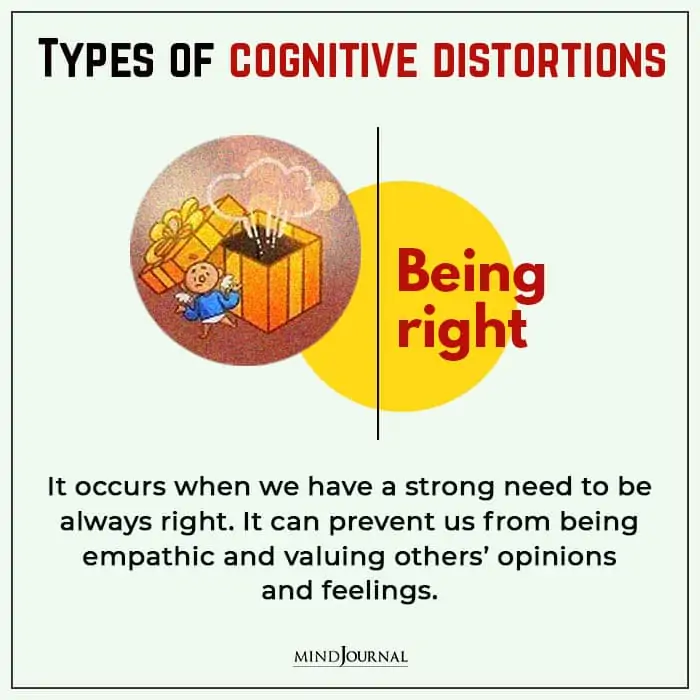
If you feel the need to be always right, then you may have one of the most widely experienced cognitive distortions. This can make you consider your own opinions and beliefs as facts and dogmas.
This can prevent you from being empathic and keep you from valuing others’ opinions and feelings while in a discussion. This can directly affect your relationships with family members, friends and peers.
As you strongly believe that you can never be wrong, you can take great efforts to prove yourself right in a debate. Sometimes being right can be more important to you than maintaining relationships with loved ones.
However, apart from the ones mentioned above, there are many other cognitive distortions that we can experience. Some of them are mentioned below:
- Gratitude trap
- Halo Effect
- Self-serving bias
- Entitlement beliefs
- Biased implicit attitudes
- Cognitive conformity
- In-group bias
- Assumed similarity
- Inability to consider opportunity cost
- Unrelenting standards
- Heaven’s Reward Fallacy
- Positively biased predictions
- The tendency to prefer familiar things
- The peak-end rule
- Inability to consider alternative explanations
- Delusions
Read also: 10 Common Thinking Errors We Make Unknowingly
The board of directors
Apart from Aaron Beck’s research on cognitive distortions, psychotherapist Matthew Cooksey and best-selling author Georgia Murch have also identified the following thought distortions, identified as ‘The Board of Directors’, that dominate our minds and distort our thoughts:
1. Blamers
These are people who always blame others for their own mistakes and rarely own up to their own actions.
2. All about me-ers
As the name suggests, these individuals tend to be highly self-centered and selfish. They believe everyone is focused on them all the time.
3. Black and white thinkers
These people have polarized thinking and believe something is either perfect or unacceptable. There is no middle ground.
4. Negative thinkers
They always focus on the negative aspects of things and weed out the positive traits. They believe that the glass is always half empty.
5. Catastrophizers and minimisers (C&Ms)
These types of people either exaggerate or minimize information, situations or issues more than they actually are.
6. Always right
Known as ‘Righties,’ they constantly need to prove that their opinions are right and their actions or behaviors are correct in any given situation.
7. Powerless
Also identified as victims, these individuals feel helpless as they tend to believe that everything is out of their control.
8. Perfectionists
They are always focused on attaining perfection in everything they do and set impractical standards and expectations for themselves.
9. Labellers
They are quick to make judgments about others based on limited information and make decisions based on their inaccurate judgments.
10. Entitlers
They believe that they are special individuals who should be treated better than others, regardless of whether they deserve it or not.
Read also: How Writing Can Help in Brain Development
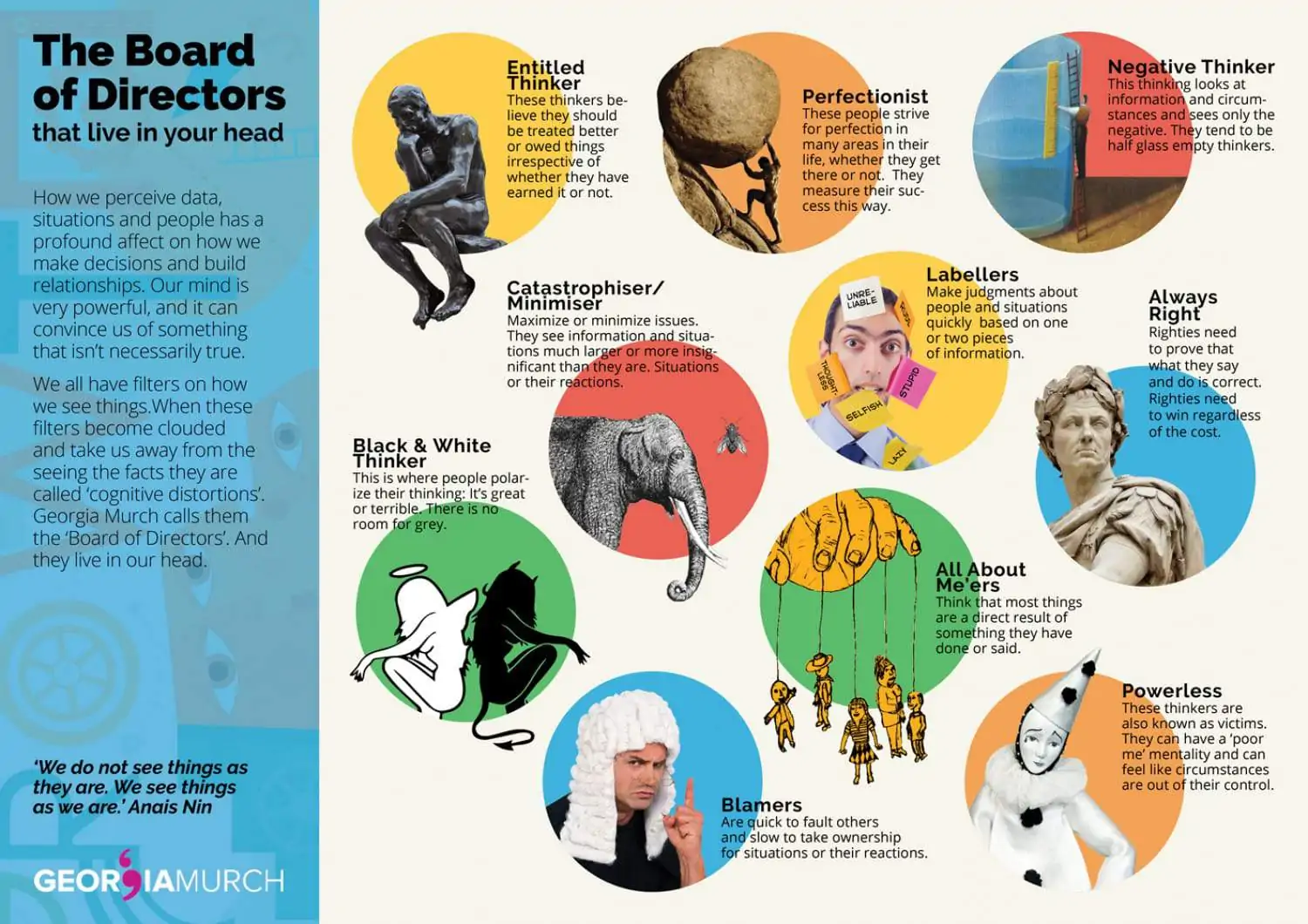
Overcome cognitive distortions

Most of us can relate to some of these distorted thinking patterns. Now that you have gained some basic understanding of different types of cognitive distortions, learn to identify them when you engage in such flawed thought patterns.
Once you learn to recognize them when they occur by being aware of your thoughts, you can start changing them. Cognitive-behavioral therapy (CBT), rational emotive behavioral therapy (REBT), and cognitive restructuring can help you modify automatic thoughts so that you can better control your behaviors and emotions.
However, if such flawed thinking is causing mental health issues, like anxiety and depression, then make sure to seek professional help immediately. Changing negative beliefs and thoughts can enable you to feel motivated and live a more positive life.
Read also: How to Improve Your Cognitive Function?
Frequently Asked Questions (FAQs)
What causes cognitive distortions?
Distorted thoughts arise from negative core beliefs which may be triggered by negative, neutral, or positive situations or events.
How to challenge cognitive distortions?
Cognitive-behavioral therapy (CBT), rational emotive behavioral therapy (REBT), and cognitive restructuring can help you modify distorted thoughts. Changing negative beliefs can also help you overcome cognitive distortions.
Are cognitive distortions normal?
Although having cognitive distortions are not normal, distortions in thinking tend to be common. But these can be really difficult to identify, especially when we are unaware that we can change them.
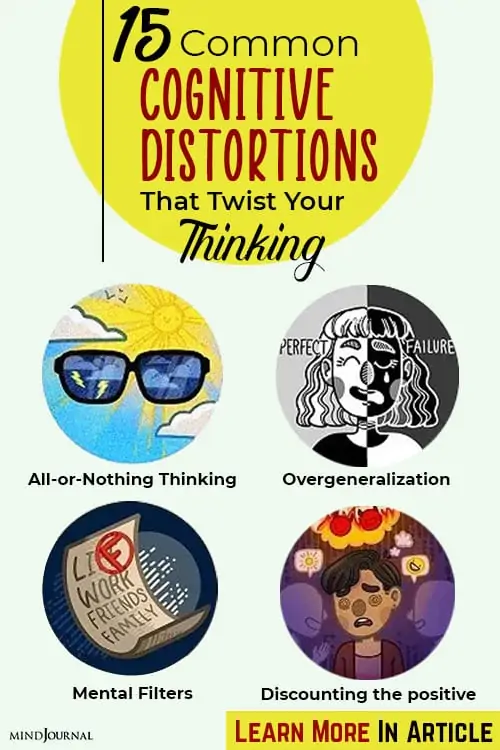
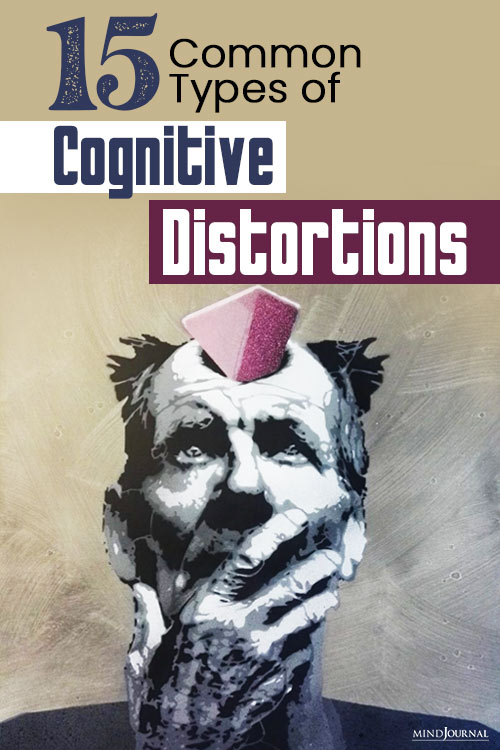
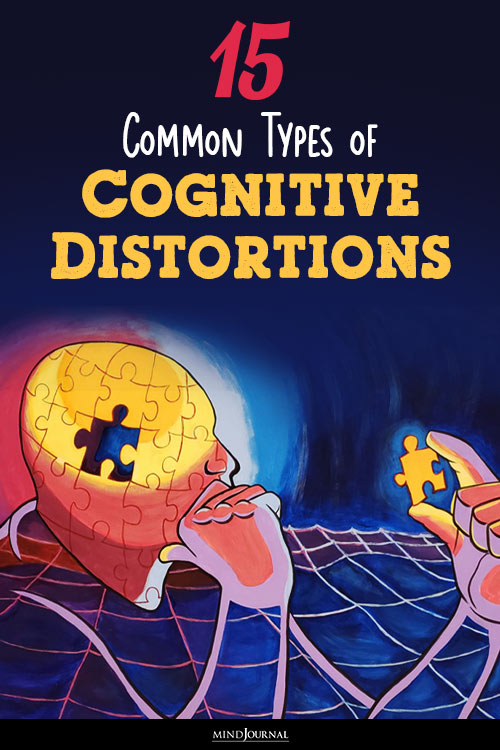
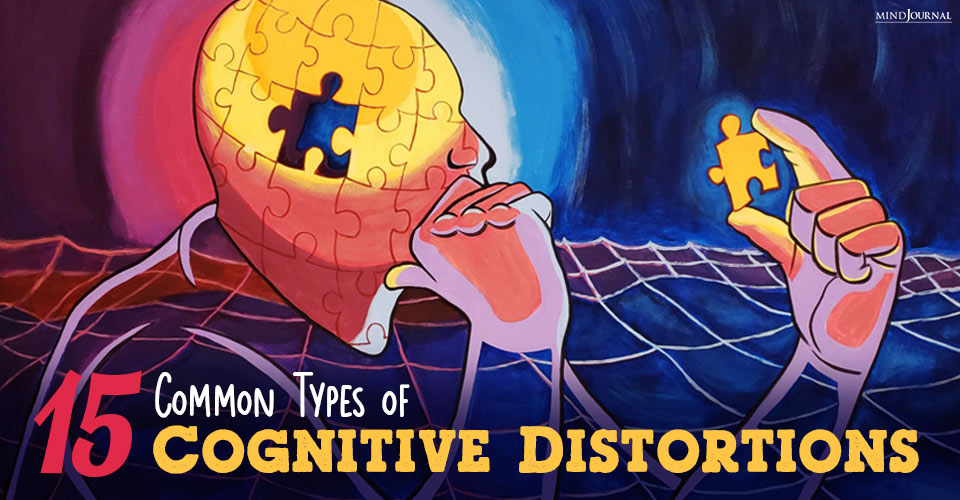







Leave a Reply
You must be logged in to post a comment.